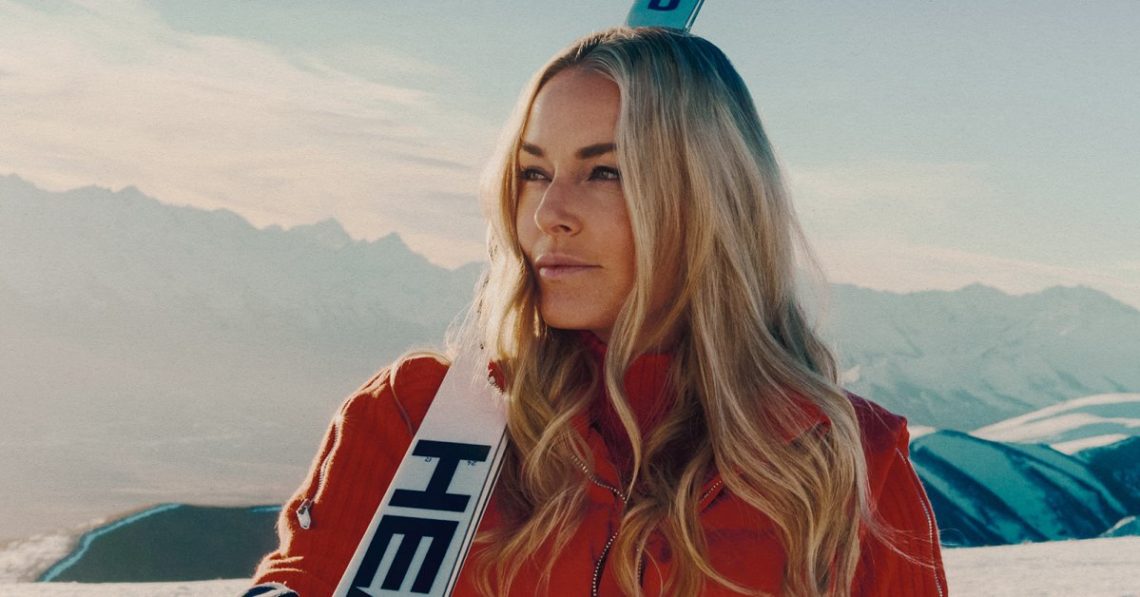Lindsey Vonn lifts her middle finger in the Southern California sun. Vonn, the Olympic gold medal skier, all-time leader in World Cup downhill wins, and rare figure in her sport whose talent, charisma, and celebrity have transcended the snow-covered slopes, is hiking a canyon near her Beverly Hills home. Not so long ago, this might have seemed unfathomable, as she struggled with not just standard wear and tear that comes from decades of competing at a professional level but swelling and pain caused by numerous crashes while flying down mountains. Since her partial knee-replacement surgery in the spring of 2024, however, Vonn, 41, has felt like a new person.
The gesture, though, is not just one of defiance as she walks briskly on the somewhat hilly terrain. It’s a message to her detractors.
When Vonn launched a surprise comeback last year, after having been retired from the tour for five seasons, many fans cheered her return. But critics made themselves heard as well. They suggested her decision—and goal of earning a spot atop the podium in Cortina d’Ampezzo, Italy, at the 2026 Olympics—revealed an unfulfilling life and wondered why she’d even try such a thing at her age.
Vonn was undeterred. Besides the faith she had in her newly restored knee and her unflagging work ethic, she had planted a little pep talk for herself years earlier. Before her last Olympics, in 2018 in PyeongChang, she got a tattoo on the middle finger of her right hand that reads πιστεύω, which means “believe” in Greek, the language of the birthplace of the Olympic Games. “Believing in myself has always been so important,” says Vonn. “Now it has probably never rang more true.” And so as she directs the digit at her doubters, with an impish grin, she displays the word in all its glory. Then, for good measure, she does it again.
As the world’s best winter athletes gather in February for a celebration of speed, acrobatics, and artistry on snow and ice, Vonn’s attempt to earn another Olympic medal will likely be the buzziest story of the Games. During her illustrious career, Vonn, a Minnesota native who learned to ski on a tiny hill south of the Twin Cities, won a record-tying 20 World Cup crystal globes, awarded annually to the best performer in the various disciplines of skiing (downhill, slalom, etc.), plus the best all-around performer. She earned gold and bronze medals at the 2010 Vancouver Olympics, becoming the first U.S. woman to win gold in downhill, and her campaign to ski against men, which the sport’s bigwigs denied, drove considerable attention. Before injuries got the best of her, she was on pace to pass the mark for all-time World Cup victories: 86, set by Ingemar Stenmark of Sweden. Instead, Vonn won 82 times, and American Mikaela Shiffrin has since set a new record, with 101 and counting.
Vonn’s bionic quest will do nothing less than test the boundaries of human capabilities. No ski racer, male or female, has ever returned to the top level with titanium implanted onto the sport’s central piece of hardware. With another Olympic medal, she’d shatter the previous record for the oldest female alpine Olympic medalist: 33, Lindsey Vonn, in PyeongChang. Advances in sports science have allowed a host of high-profile male athletes to extend their greatness into middle age: Tom Brady winning a Super Bowl at 43; Tiger Woods, whom Vonn dated for nearly three years in the 2010s, victorious at the Masters at the same age; LeBron James still making all-NBA teams at 40. Female examples, Vonn notes, are harder to find.
Since retiring from skiing in 2019, Vonn has faced tribulations that made her arrival at this moment even more remarkable. And after some disappointing results in her 2024–2025 comeback season that left her questioning the efficacy of her endeavor, a second-place finish at the World Cup Finals in Sun Valley, Idaho, in March gave her momentum going into her upcoming campaign, which starts Dec. 12 in St. Moritz, Switzerland. That performance, plus a full offseason dedicated to rigorous strength workouts, has boosted her confidence. “I am not a long shot,” says Vonn during an expansive pre-hike conversation on her living-room couch. “I am back in the game.”
Some 48 hours after what she thought would be her final ski race, a bronze-medal downhill run at the 2019 World Championships in Are, Sweden, Vonn woke up in Nashville, where her boyfriend at the time, P.K. Subban, was playing for the NHL’s Predators. She called her agents, antsy, asking them to book something, anything, for her to do. They laughed. “The postcompetition chill out,” says Mark Ervin, one of her reps, “did not last very long.”
Vonn had first put on a pair of skis at age 3 and competed in her first race at 7. Without skiing, she struggled to find her identity. “I felt a pretty big hole,” she says. “You don’t want to get out of bed and you’ve got no drive.” She’d felt depressed after prior ski injuries, especially the ACL tear during a November 2013 training crash that ultimately kept her out of the Sochi Olympics. Back then, however, she could at least look forward to returning to the mountain. “It was the one thing that really made me happy,” says Vonn. “When I retired, that first year was like, ‘How do I get out of this funk? What is going to make me feel like I have a purpose?’”
It didn’t help that her personal life was also undergoing upheaval. Vonn and Subban, who got engaged in August 2019, split in December 2020. “I don’t want to get too into the weeds on it,” says Vonn, “but I’m not the kind of person that is going to stay home and not work.” (Subban declined to comment.)
Vonn’s friends have called her “the most confident unconfident person” they know, and her new therapist, Armando Gonzalez, would spend days with her in her homes in Beverly Hills and Park City, Utah, talking through Vonn’s adjustment to her new life. “It’s reckoning with some of these limiting self-beliefs that I would call lies,” says Gonzalez, who spoke with TIME with Vonn’s permission. “When you get to the root of them, they were plaguing her and limiting her in a lot of areas. She would need to remove them.”
Her retirement funk gradually faded. Vonn co-directed a documentary about U.S. Olympic ski champion Picabo Street, her childhood idol and later mentor. She wrote a memoir, launched a skiwear line with longtime sponsor Head, and invested in a pair of National Women’s Soccer League franchises. Vonn put more energy into her foundation, which over the past decade has awarded more than $1 million in scholarships for girls who show both athletic and academic promise. “I definitely have grown a lot since I retired,” she says.
Vonn also drew strength from her mother Linda Krohn, who had a stroke while giving birth to her in 1984. (Vonn gained a younger sister in 1986 and three more siblings, triplets, in 1992; Krohn and Vonn’s father Alan Kildow split in 2003. The last name Vonn is a remnant of a marriage that ended in 2013.) In the summer of 2021, Krohn, who already had limited mobility from the stroke, was diagnosed with ALS. “It was full meltdown,” says Vonn. But even with the additional burden of this new diagnosis, Krohn stayed upbeat. Someone told her that when she couldn’t lift her arms above her head, she was nearing the end. So she’d raise her hands and declare it another great day. “One thing that my mom’s really given me is the ability to pick myself back up,” says Vonn. “That’s what she did her whole life, and I’ll never stop doing that.” Krohn died in August 2022.
Still, mental fortitude could not erase the reality: Vonn’s body was breaking down. Upon retiring, Vonn says, “I didn’t really factor in the unfortunate part of not having a full-time physio. Like, ‘Sh-t, everything hurts. Who’s here to fix me?’” After two ACL tears, an MCL tear, shinbone fractures, and nine knee surgeries, she couldn’t complete a flat hike with a friend and the friend’s two kids. Even Vonn’s dogs looked at her askance. “They were like, Why are we stopping?” To take pressure off her knee, she’d elevate it on a chair at galas, on the dashboard while in a passenger seat. Kildow, a former competitive ski racer, felt guilty about introducing his daughter to the sport. “She’s going to have a physical deficit for life,” says Kildow. “And that really bothered me a lot.”
Vonn walked with a limp, which contorted her body in a way that put stress on other areas, like her hips and ribs. “I was like, ‘I just can’t do this,’” says Vonn. “I can’t keep managing my body in this way. It’s not sustainable in any way.”
She connected with Dr. Martin Roche, a South Florida–based surgeon, who recommended a robotic-assisted partial replacement for Vonn’s right knee. Vonn’s major pathology was cartilage loss on her lateral, or outer, side. A minimally invasive procedure would keep her ACL, her medial meniscus and the cartilage on the inner part of her knee intact. This would aid her postsurgery proprioception, or “sixth sense” ability to be aware of the movement and location of her knee joint for improved stability and balance.
Through a CAT scan, Roche built a virtual 3D model of Vonn’s damaged knee. Before the April 2024 surgery, he used it to size the titanium implant. In the operating room, Roche guided the robotic arm that removes damaged bone and cartilage. “It’s almost coloring within the lines,” he says. “I can get down to millimeter precision.” He didn’t touch any muscle, ligaments, or tendons. “Recovery is much faster because we haven’t traumatized or damaged any soft tissue,” he says.
But no one—not even Roche—expected Vonn to bounce back as quickly as she did. She could fully extend her knee. She was back in high heels within a month. “Every day,” says Vonn, “it was becoming more and more clear that this was different.” She played tennis, on a hard court, with her ski coach, Patrick Riml. “She’s running around like a 15-year-old, going after every single ball,” says Riml. “I’m like, ‘Holy cow.’” Vonn sent Roche a video of herself doing a single-leg jump onto a box, something she hadn’t been able to do in years. Roche calls this his aha moment: he would sign off on any ski comeback, confident that Vonn’s implant could withstand even the downhill’s twists and g-forces.
The ski bug had never left Vonn. Doing NBC commentary for the 2022 Beijing Olympics was difficult. “Everyone is texting me, ‘You would have crushed this course,’” says Vonn. “And I’m like, ‘Can you please not say that? This is not helping.’” Before her knee replacement, a return was out of the question. But in June 2024, after another robust weight-lifting session, she informed her agents of her plan to return to the mountain for a few training sessions, with the potential to launch a full comeback targeting the Olympics. After a moment of stunned silence, they were on board.
Fear wouldn’t be a factor. As part of their therapy, Gonzalez insisted that he and Vonn spend an afternoon rewatching her worst accidents, so she could release them from her subconscious. Vonn told him this exercise wasn’t necessary. “I’m like a goldfish,” she says. “You have to have a three-second memory.” They viewed the crashes anyway: Vonn broke them down as if they were routine football plays. “She has a superhuman ability,” says Gonzalez, “to disassociate from pain.”
“I’ve got a few circuits missing,” says Vonn, in a less clinical assessment. “I love what I do. I love going fast. I don’t think that will ever change.”
In July 2024, Vonn was waking up at 3:30 a.m. every morning to ski a glacier in Austria. “Seeing her up there, pretty much in the middle of the night with the sun coming up, the smile on her face, the look in her eye, it’s like, ‘This is what she wants,’” says Riml. In New Zealand, she trained super-G with top Kiwi racer Alice Robinson and nearly matched her times while skiing in a vest and shorts. (Robinson, Vonn says, was wearing a more aerodynamic racing suit.) Word spread that Vonn was toying with a return. Norwegian skiing star Aksel Lund Svindal, the two-time Olympic gold medalist whom Vonn recently added to her coaching team, texted her about her plans. Vonn usually responds to Svindal right away. This time, she went silent. “I caught onto her,” says Svindal. “Yup, she’s definitely considering a comeback.”
Vonn dreaded calling her father. She figured he’d chew her out for putting her finally healthy knee at risk. So she sent him a formal email. When they did connect on the phone, Kildow told her he knew how much she loved skiing in Cortina—it was the site of her first World Cup podium, almost 22 years ago—and that she deserved another shot at the Olympics. And, he added, even if he had disagreed with her decision, his hardheaded daughter wasn’t going to listen to him anyway.
The call went well. Perhaps too well. “I was like, ‘Aren’t you going to be a little concerned with my health?’” says Vonn.
After Vonn publicly announced in November 2024 that she was returning to World Cup skiing, a few of the sport’s prominent voices questioned her motives. “She should see a psychologist,” said two-time Olympic champion Michaela Dorfmeister of Austria. “Does she want to kill herself?” The downhill great Franz Klammer, also of Austria, said Vonn had “gone completely mad.” Swiss four-time overall World Cup champion and 1988 Olympic downhill gold medalist Pirmin Zurbriggen suggested she was starved for attention. “I have the feeling that Vonn hasn’t recognized the meaning and purpose of her other life in recent years,” he said. “She has probably suffered from no longer being a celebrated champion.”
Vonn despised these remarks. “They have no idea who I am. They have no idea what I’m doing,” she says. “They just want to be heard. It’s much more exciting when they say sh-tty things about me.” (Klammer, Dorfmeister, and Zurbriggen did not return requests for comment.) Yes, Vonn concedes, the Zooms involved in her investments, foundation, and other projects don’t give her the same adrenaline boost as zooming down a mountain. “As much as I love business and it challenges me, it’s not going 80 m.p.h. downhill,” she says.
But that doesn’t mean Vonn required this comeback to give meaning to an empty existence. “I need to see a psychologist for what? What about this is so crazy?” says Vonn. “I don’t need this. I’m doing it because I love it. It’s fun and it’s a challenge. And I think it means a lot to a lot of people. It’s not like I lack fulfillment. I don’t lack purpose. I don’t lack joy. I have all the things that I need in my life. Even though I’ve been through a lot of sh-t, I’m lucky enough to do what I love one more time. The only danger this presents is to myself. I am not endangering anyone else in this process.”
The negative headlines offered Vonn extra fuel. “I know exactly who said what about me,” she says. “It can tear you down. Or you can reframe it and use it as motivation. And that’s what I do.” Plus, Vonn is honoring the memory of her mother, who because of symptoms from her stroke couldn’t participate in most sports. “She would give anything to have this type of opportunity,” says Vonn. “My mom would be disappointed in me if I didn’t take it.”
Although Vonn spent 19 years competing in World Cup races, she had to start from behind in the standings. At the beginning of the season, she raced with the group of women outside of the top 30 in ranking points, later in the day. The more established skiers go down the mountain first, potentially wearing out the course for the also-rans. Visibility can also erode in the afternoon when the sun dips lower.
So one of the greatest downhill skiers of all time essentially had to hang with the JV squad. “It was weird,” says Vonn. Some of the women were new to the tour, half her age, and asked to take pictures with her. “They’re like, ‘I used to watch you when I was growing up,’” says Vonn. “Can we please not say that anymore? If I hear that one more time…” Slovenia’s Ilka Stuhec, 35, started calling Vonn “grandma,” a label Vonn grew tired of. “She did it to get under my skin,” says Vonn. “Like, why are we doing this? I get it if it’s the 18-year-old calling me grandma. You’re 30-something. So let’s reel it back.” (Stuhec did not return requests for comment.)
Her references to her generation’s comedies, like Dumb and Dumber and Talladega Nights, were usually met with blank stares. “Never mind,” says Vonn. “I take it back. Just f-cking go ski fast.”
Vonn’s team figured last season would serve as a tune-up. “But there’s one word in Lindsey’s world that doesn’t exist,” says Riml. “And that’s patience.” At just her second World Cup event, in St. Anton, Austria, in January, she finished sixth in the downhill and fourth in the super-G. And while her results in Cortina the next week were less inspiring—20th in the downhill, a failure to finish the super-G—at Vonn’s favorite pizza place in the Dolomites resort town, she learned that she had performed well enough to race with the top competitors group in future downhills. “I was like, ‘Good job! You’re such a good little ski racer,’” says Claire Abbe, Vonn’s friend since childhood and partner at Après Productions, the media company they launched in 2019. An all-time great was celebrating making the top 30. The table shared a chuckle.
But the World Championships, three weeks later in Saalbach Hinterglemm, Austria, failed to offer such levity. Vonn wanted to make a statement podium. Instead, she crashed into a gate in the super-G, finished 15th in the downhill, and 16th in the team combined event, which makes its Olympic debut in Cortina (a downhill skier pairs with a slalom skier; fastest total time wins). “I felt slightly embarrassed,” says Vonn. “I left Saalbach thinking, ‘If I don’t figure this out, what am I going to do? Because this isn’t going to work like this.’”
Vonn switched her boots after Worlds, to an older model that offered her a better feel on the course. But at March’s World Cup finals, she was dealing with a difficult distraction: the failing health of her Cavalier King Charles Spaniel, Lucy, whom she got after her 2015 breakup with Woods. Lucy accompanied Vonn everywhere on tour, even holding three passports. “She was my navigator,” says Vonn. “She was my companion. She was always there. I was hoping she would always be there.” Vonn tried not to check her phone for Lucy updates before the super-G—“I didn’t want it to destroy me for race day”—but she couldn’t help it.
Vonn put Lucy to sleep when she got back from the finals. But she managed to compartmentalize her sadness in Sun Valley. Vonn called the race, in which she won silver, the second most emotional finish of her career, behind only her Olympic gold 15 years ago. “Everyone told me I was crazy. Everyone told me it couldn’t be done, and it made me doubt myself,” says Vonn. “That really hurt me.”
Grandma Vonn, by the way, finished ahead of Stuhec in the overall standings. “Joke’s on her.”
Vonn and two friends pile into her Range Rover in mid-September for the short drive from her 20-acre property overlooking Park City to a disco-themed fundraising gala for her foundation. Vonn, who’s going through a country-music phase, puts on “20-20” by Ella Langley and belts out the lyrics. As she pulls up to the hotel, she notices that a sign directing vehicles to the gala is misplaced, too far up a hill for drivers to notice. So she leaps out of the car and jogs down the road in heels. There, passers-by may have noticed Lindsey Vonn, wearing a silver fringe dress, sticking a sign in the mud off the interstate.
At the event, Vonn takes pictures with a group of former scholarship recipients who now serve as youth ambassadors; in that role, these young women talk to adolescent girls about subjects like self-confidence, body image, and emotional intelligence. She also plays cajoling auctioneer assistant. When the bidding for tickets and a hotel stay for a Manchester City–Liverpool game starts slow, Vonn ups the ante with her powers of persuasion. “Tom Brady goes to this sh-t,” she announces. (Brady is a minority owner of another English soccer club, Birmingham City.) The package sells for $5,750.
“Who’s ready to party?” she says. “We look too good not to dance.”
Judging by her enthusiasm on this night, not to mention her social media feeds, Vonn seems to be enjoying her 40s. In late July, she shotgunned a beer onstage at a Dierks Bentley concert, something she would not have done when she was younger and in training. “Maybe it’s because I have a different perspective, because I’ve been retired for a long time, maybe it’s because I’m 40 and I just don’t give a f-ck anymore,” Vonn says. “But I need to enjoy my life.” She points out that she had two workouts that day: letting loose occasionally won’t compromise her goals. “My 40s, I was really dreading it,” she says. “It’s the beginning of the end. And then you get past it and realize how good things really are.”
Vonn, who now sits on the advisory board of Athena Capital, a female-led venture firm, has grown close with a group of accomplished women, including actor and entrepreneur Reese Witherspoon; venture capitalist Amy Griffin, whose 2025 memoir The Tell became a New York Times best seller; psychological researcher Angela Duckworth, a MacArthur “genius” grant recipient and author of Grit: The Power of Passion and Perseverance; and actor Mariska Hargitay, star of Vonn’s favorite TV show, Law & Order: Special Victims Unit. On the road, Vonn uses Olivia Benson as her alias. In July, a car-service driver complimented Vonn on an episode. “Oh,” he also told her, “you dyed your hair blonde.” Vonn rolled with it, thanking the guy.
Vonn knows that some people think she cares too much about celebrity hobnobbing. We are hiking near Hollywood, she’s a regular on red carpets, and during the U.S. Open final between Jannik Sinner and Carlos Alcaraz in September, she showed up on national TV, in Sinner’s box. (Sinner grew up skiing and was a fan of Vonn’s, and they’ve become friends.) But she calls the idea that she’s obsessed with fame the biggest misconception about her. “I’m not meeting these people because they’re famous,” says Vonn. “I’m interested in who they are, how they got there, and I enjoy watching their professions and they enjoy watching me.”
While Vonn’s quite content with her life at the moment, she still wants to start a family. She’s frozen her eggs, she tells me, which eases some pressure on that front. “I’m not stressed about it, which gives me peace of mind,” says Vonn. “But that’s definitely something that I’m really looking forward to.”
For now, another pup will do. After Lucy’s passing, Vonn questioned whether, at this point in her life, she really needed a dog with her all the time. But her sister reminded her that she’s happier around her pets. “The only negative about the sport is you just go home to an empty hotel room,” says Vonn. “It’s a tough life to live. I don’t have to live it that lonely.” In August she adopted Chance, a Cavalier like Lucy, but with a brown polka dot on his head. Before the fundraising event, Chance tried his best to mangle duck and Lamb Chop chew toys, and peed on some bricks in front of Vonn’s home.
Friends know Vonn’s feeling good psychically, and with Chance in her carry-on, she’s in a positive place. So she has inspired some certitude. In Cortina, Vonn will likely compete in three events: the downhill, super-G, and the combined team competition. “She’s going to win one of them, if not more,” says Picabo Street, who’ll be commentating for NBC. “It’s not a matter of if, it’s when.”
Since her announcement nearly a year ago, Vonn has come to realize that an Olympic medal—especially a gold—will elevate her place in sports history. Such knowledge can overheat an athlete’s brain. But sitting on her Beverly Hills couch, Vonn says she doesn’t see it that way. “I think it’s a good thing,” she says. “I like it when the stakes are high.”
While Shiffrin has the most World Cup victories ever, and Vonn considers her the greatest skier of all time, Vonn also doesn’t object when her own name comes up, as it did when Bentley called her the GOAT at his concert. Vonn, for example, calls Roger Federer her tennis GOAT, even though Novak Djokovic has more major victories. “I don’t think it necessarily always comes down to how many wins you have,” says Vonn. “I think it’s also the impact you have on sports and culture. I do think I’ve changed the way people view certain things in skiing and in sports and in culture. My goal is not to just be a ski racer. I’m not a robot. I’m not just there to win. I’m there to enjoy the mountain and to be myself. I wouldn’t do it otherwise.”
Winning Olympic gold, in such historic fashion, could certainly alter that GOAT conversation. “I don’t know how satisfied I would be if I walked away with no medal,” says Vonn. “But I don’t think that’s going to happen.” What Vonn knows for sure is that if she makes it to the Cortina starting gate, you’ll be watching. “I’ve already done more than anyone ever expected,” she says. “I’ve already done the impossible.”
The post Inside Lindsey Vonn’s Unprecedented Attempt at an Olympic Comeback appeared first on TIME.




